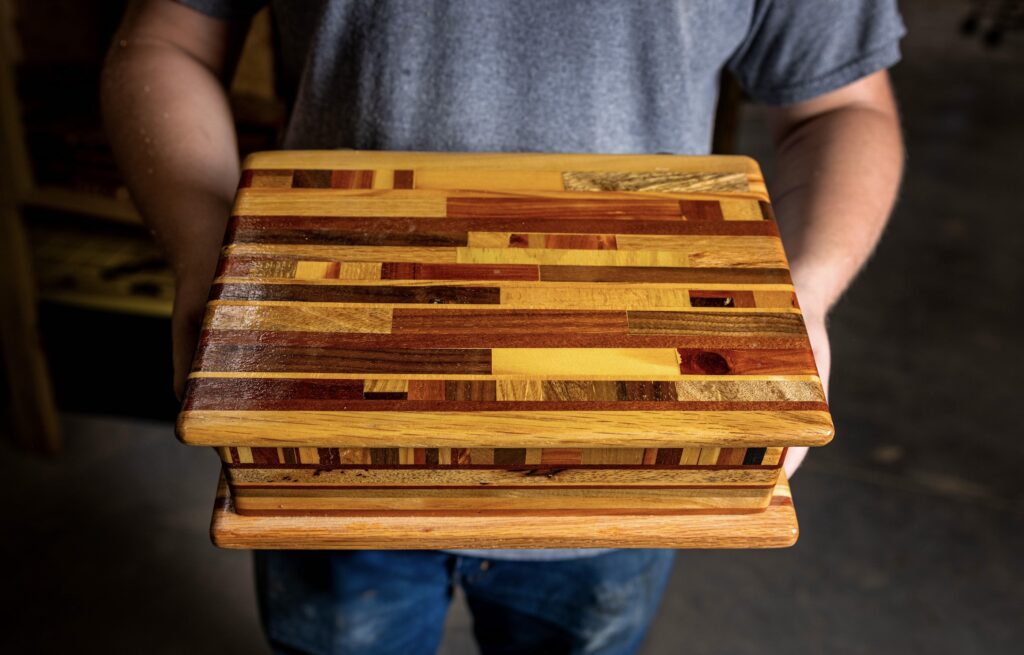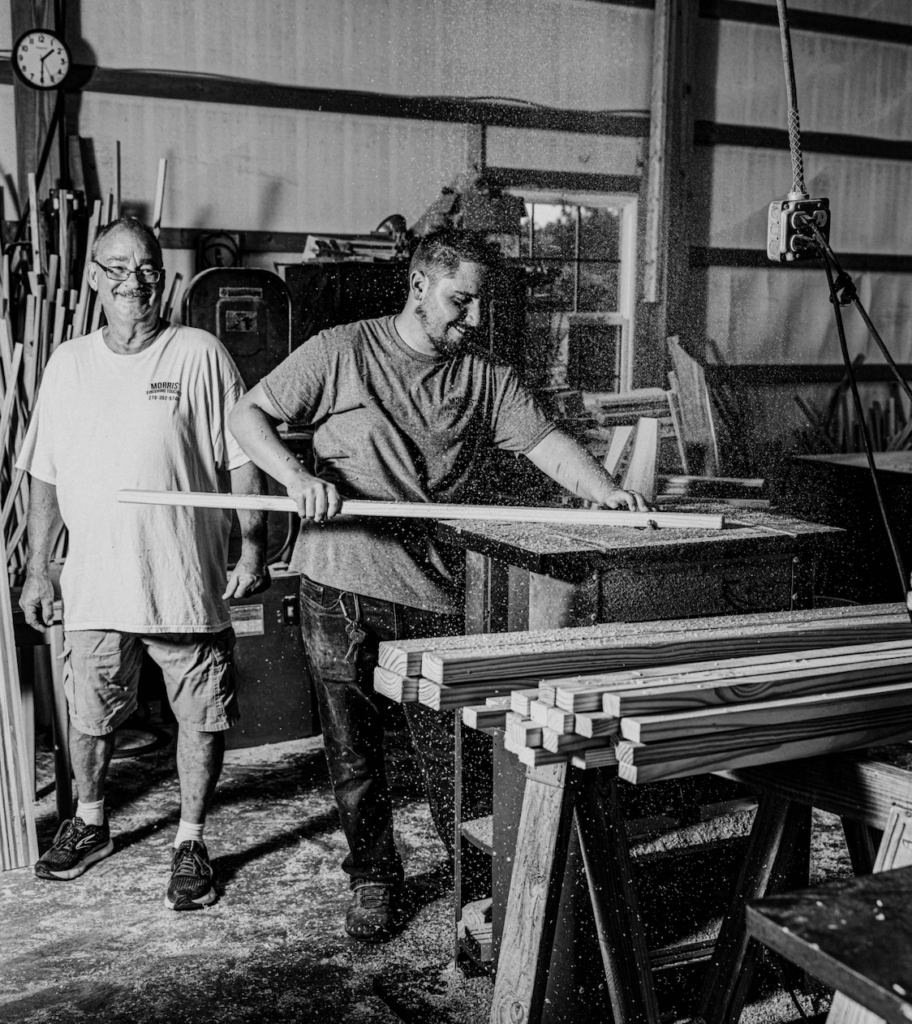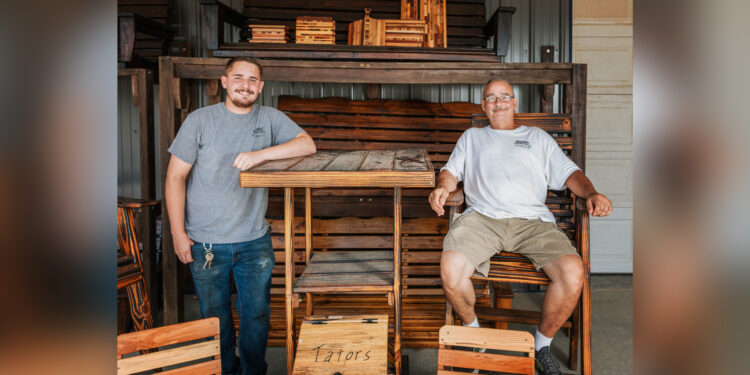Crafting comfort and legacy at Morris Finishing Touches
Photos by Jamie plain
Just off KY 144 in Philpot, the saws hum, the scent of fresh-cut wood hangs in the air, and two craftsmen separated by a generation but joined by purpose quietly carry on a dream.
This is Morris Finishing Touches, a small woodworking business where every item is made by hand, every board has a story, and every swing, table, or keepsake box is crafted to last.
Founded in 2007 by Dennis Morris, the business began as a tribute to a father-son dream.
“My dad and I were supposed to do this together,” Morris said. “We talked about it for years, how when we were done with public work, we’d build things. He didn’t get the chance, but I kept going with the dream.”
Today, Morris is joined by a young craftsman who didn’t grow up in the trade but quickly made it his life’s calling. Tyler Harris, now co-owner, found Morris Finishing Touches when he was 18 and looking for something different than a typical job.
“I didn’t want to work in a store or restaurant,” Harris said. “I wanted to make things. Something creative. So I reached out to Dennis. Turned out, he only had one employee at the time, but he took me in.”
What began as weekend lessons soon turned into full-time work. After two years of learning the craft and dedicating himself fully to the business, Harris became co-owner.
“This is what I love,” he said. “I plan on being here until I physically can’t anymore.”
Together, Morris and Harris craft what they call “usable art” — swings, rocking chairs, charcuterie boards, toy boxes, concealment tables, and more. Every piece is practical, yet designed to be beautiful enough to display.
While he’s perhaps best known for his swings — so much so that they’re printed on the back of the business’s shirts — Morris also creates highly personalized pieces. Customers often bring in photos, sketches, or measurements, and Morris and his team bring the vision to life.

One of the most unique creations in his shop is a potato and onion box made from “bug art” — wood that insects have naturally tunneled through.
“It’s really striking,” he said. “The holes go all the way through in some spots. It almost looks like one of those ant farms you’d see behind glass.”
Morris learned woodworking from his father and grandfather, both of whom built their own furniture and passed down the skills that now shape every item in the shop. He uses more than 40 types of local wood — including cherry, cedar, poplar, and walnut — most of which he mills and dries himself.
“We cut the trees, take them to the sawmill, and dry them in the barn — usually for five years or so before we ever use them,” he said.
Harris has brought his own touch to the business, too. Most notably, he introduced a traditional Japanese burning technique called shou sugi ban to the shop’s offerings.
“It’s a way of burning the soft grain in the wood and bringing out the hard grain,” he explained. “It looks cool, but it’s also functional and offers benefits to the wood. It helps keep insects away, which is a big deal with outdoor furniture.”
Customers can request the burning style on swings or tables at no extra cost, and Harris said it’s quickly become a customer favorite.
He also enjoys building concealment furniture — items like tables or boxes with hidden compartments.
“They’re really fun to make,” Harris said. “You can get super creative with them, and they’re always different.”
Everything at Morris Finishing Touches is built to last. The swings, for example, are made from pressure-treated pine — the same material used for decks — and sealed with three coats of UV-protectant. Zinc-coated hardware helps prevent rust. And the weight alone speaks volumes.
“One customer bought a swing from a store, and you could lift the whole box with one hand,” Harris said. “That’s not going to happen with ours. Ours are solid. We had a swing come back after 15 years, and all it needed was a fresh coat of stain.”
That durability, Morris said, is in the time and care that goes into each piece, something customers can see and feel when they visit the shop.

“Until you sit in one of our chairs or swings, you don’t really know what you’re getting,” he said. “They’re heavier than what you’d find in a store, but they’ll last you a whole lot longer.”
While there’s no traditional showroom, Morris is typically on-site from 9:30 a.m. to 6 p.m. most days. He encourages people to call ahead and stop by — not just to browse, but to try out the furniture themselves.
As for what’s next, Morris and Harris both have their eyes on growth.
“I’ve already moved once just a little farther down the road from where I was, and I’m hoping to get bigger,” he said. “If we keep expanding, I’ll need more space, and hopefully more full-time help.”
But neither of them is looking to get too far from the core of what makes Morris Finishing Touches special: building things that matter, by hand, with purpose.
The name says it all.
“It’s my last name, of course,” Morris said with a smile. “But I wanted something that reflected what we do, the finishing touches for a home. Chairs for the porch, swings in the yard, cutting boards on the counter. The little things that make a place feel complete.” OL










